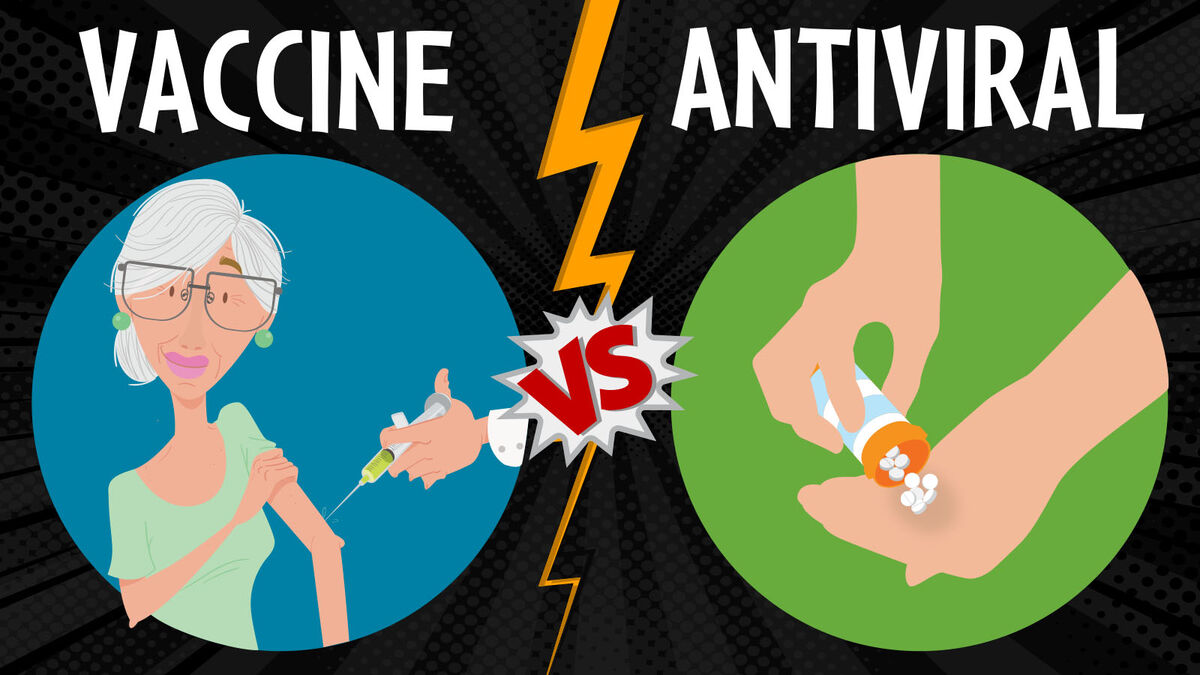
Vaccine vs. Antiviral
The biggest difference between vaccines and antiviral agents is when they are used in the course of a virus. Vaccines are part of preventative care and are usually given before a patient catches a virus. Once a patient becomes ill from a virus, a doctor would prescribe antiviral agents to fight the virus and stop it from infecting the patient further.
How Viruses Work
Before you learn about how vaccines and antiviral agents work, let’s take a moment to discuss how viruses work. Here are some basic facts about viruses and what they do in the human body.
- Unlike bacteria, viruses are not alive. They take over living cells in the body and instruct it to make more virus-infected cells. This is how viruses infect the body.
- Viruses typically enter the body through the respiratory system.
- Without the presence of a cell to take over, viruses can’t function on their own. That’s why they don’t multiply on kitchen counters or in the air.
- Some viruses mutate into different strains as they are copied from cell to cell. Mutated viruses make it difficult to treat patients because a medication that works for some strains of the virus might not work for others.
Some viruses are more contagious than others. If you’d like to read more about common viruses, read an article that details viruses that cause disease in humans.
How Do Vaccines Work?
Starting from two months of age, you can receive vaccines that immunize you against many viruses. Vaccines are typically injections or nasal sprays that contain inactive viruses. When they enter a person’s body, their immune system fights the virus as if it were an active infection. This process trains the immune system to effectively fight the virus if the person encounters it again.
Types of Vaccines
Vaccines contain different elements depending on the virus. Some vaccines use “live” viruses for the body to fight, while others only use parts of a virus. The four types of vaccines are:
- Live-attenuated: Vaccines that use weakened viruses. These are the most effective long-term vaccines.
- Inactivated vaccines: Vaccines that use “killed” viruses. These vaccines often require a booster shot to remain effective.
- Subunit, recombinant, polysaccharide, and conjugate vaccines: Vaccines that use parts of viruses (e.g. proteins, lipids, etc.). Like inactivated vaccines, these vaccines may require booster shots.
- Toxoid vaccines: Vaccines that use the toxins produced by a virus that makes you sick. Toxoid vaccines also require periodic booster shots.
If you’ve received routine vaccinations throughout your life, you’ve probably received each of these types of vaccines. Check out a list of vaccines from each category, as well as their common abbreviations.
Immunocompromised Patients and Herd Immunity
Not everyone can get vaccines. They can be risky to people who are immunocompromised, such as cancer patients, infants younger than two months old, and elderly people. But if enough people in a population receive a vaccine, herd immunity can protect vulnerable people who can’t be vaccinated against dangerous viruses.
Why Don’t All Viruses Have Vaccines?
Scientists have developed vaccines for many viruses, including measles, smallpox, and polio, that have nearly eradicated these diseases. However, they have not been able to develop vaccines for viruses such as HIV (Human Immunodeficiency Virus) and malaria.
Lack of financial investment can make it difficult to research more complex viruses. Additionally, complex viruses often mutate too quickly to ensure 100% vaccination. For example, humans can be completely immunized against measles during childhood. However, they must receive new flu shots every year to cover mutated strains.
Can a Vaccine Make You Sick?
Patients may experience mild side effects after receiving vaccines. These side effects include mild fever, rash, or muscle aches at the injection site. Severe side effects are very rare (one or two out of a million patients).
However, because the virus in the vaccine is not active, the patient can’t catch the virus from the vaccine. Their side effects may mimic the symptoms of the illness, but in reality, their body is becoming stronger against the virus.
How Do Antiviral Drugs Work?
For viruses that do not have an effective vaccine, antiviral agents can be a good way to protect the body. Antiviral agents come in the form of medications or drugs. They stop the virus from replicating any further, which stops the infection before it can make the patient sicker.
Some examples of antiviral agents include:
- Acyclovir: Works against varicella (chicken pox, shingles)
- Azidothymidine (AZT): Works against HIV
- Hydroxychloroquine: Works against malaria
- Sovaldi: Works against Hepatitis C
- Tamiflu: Works against influenza
Taking antiviral medication after you have caught a virus can shorten the time you are sick. However, taking these prescriptions before you become infected can’t prevent you from getting sick. They are only designed to stop a virus once it has infected host cells in a body.
Are Antiviral Agents and Antibiotics the Same Thing?
When patients feel sick, they often ask doctors for antibiotics in order to feel better. But antibiotic medication only works for illnesses that are caused by bacteria, such as tuberculosis and bacterial meningitis. It’s important not to take antibiotics more than necessary because your body might develop an antibiotic resistance.
Fighting Illness With Multiple Approaches
Thanks to centuries of medical research, doctors are able to identify and treat viruses before they spread too far. As vaccines eliminate more diseases, it’s important for doctors to learn more about new diseases and how they spread. Learn more about zoonotic diseases that pass between animals and humans and how they spread.